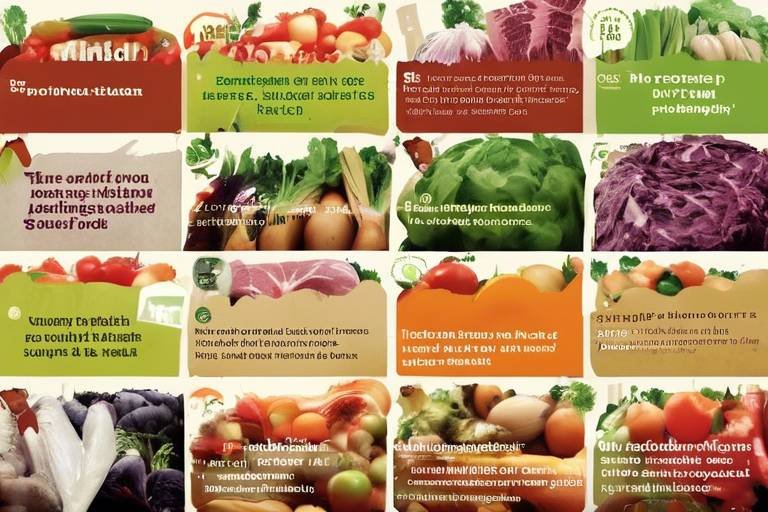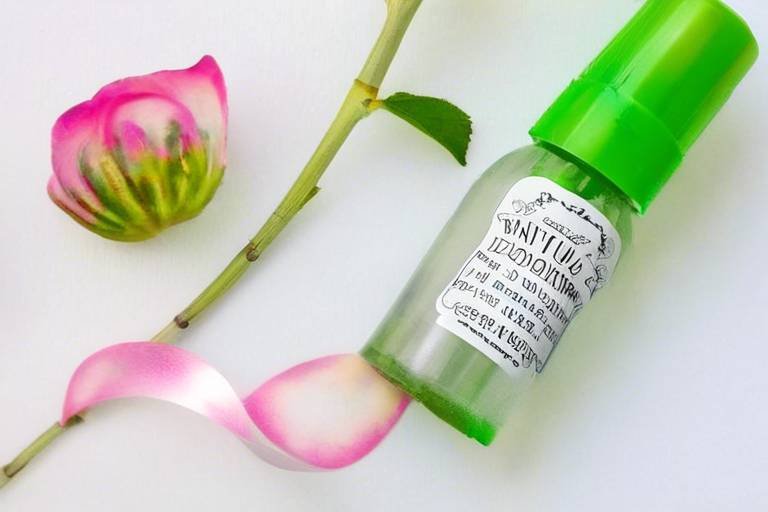How to Make Your Own Natural Fertilizer from Kitchen Scraps
Are you tired of spending money on store-bought fertilizers that are filled with chemicals? Why not take matters into your own hands and create nutrient-rich fertilizer right in your kitchen? By utilizing kitchen scraps, you can produce natural fertilizer that not only benefits your plants but also helps reduce waste and your carbon footprint. Let's dive into the exciting world of turning kitchen waste into a powerful plant booster!

Benefits of Using Natural Fertilizer
Using natural fertilizer offers a plethora of benefits for both your plants and the environment. Unlike chemical alternatives, natural fertilizers are eco-friendly and promote long-term soil health without harmful synthetic additives. By incorporating natural fertilizer into your gardening routine, you can enhance soil structure, increase microbial activity, and boost plant growth naturally.

Types of Kitchen Scraps to Use
When it comes to making your own natural fertilizer from kitchen scraps, the types of scraps you use play a crucial role in the quality of the end product. Not all kitchen waste is suitable for composting, so it's essential to know which scraps are ideal for creating nutrient-rich fertilizer. By selecting the right types of kitchen scraps, you can ensure that your plants receive the necessary nutrients for healthy growth.
One of the most common kitchen scraps that are perfect for making natural fertilizer is fruit and vegetable peels. These peels are rich in essential nutrients like potassium, phosphorus, and nitrogen, which are beneficial for plant growth. When composted properly, fruit and vegetable peels break down into valuable organic matter that enriches the soil and improves its structure.
In addition to fruit and vegetable peels, eggshells and coffee grounds are also excellent additions to your natural fertilizer mix. Eggshells provide calcium to the soil, which is essential for strong cell walls in plants. Coffee grounds, on the other hand, are a good source of nitrogen, making them valuable for promoting leafy growth in plants. Including these kitchen scraps in your compost pile can enhance the nutrient content of your fertilizer.
Furthermore, when preparing kitchen scraps for composting, it's important to ensure that they are free from any contaminants like oil, salt, or meat products. These contaminants can disrupt the composting process and may introduce harmful pathogens into the soil. By sticking to plant-based scraps and avoiding processed foods, you can create a high-quality natural fertilizer that benefits both your plants and the environment.

Fruit and Vegetable Peels
Fruit and vegetable peels are often discarded as waste, but they hold a treasure trove of nutrients that can benefit your plants when composted. Citrus peels, for example, are rich in vitamins and essential oils that can help repel pests in your garden. Similarly, potato peels contain potassium, a vital nutrient for plant growth. By composting these peels, you not only reduce waste but also enrich the soil with valuable nutrients.
When composting fruit and vegetable peels, it's essential to chop them into smaller pieces to speed up the decomposition process. This allows the microorganisms in the compost pile to break down the peels more effectively, releasing nutrients into the soil. Mixing different types of peels can create a balanced blend of nutrients for your plants, ensuring they receive a diverse range of beneficial compounds.
Additionally, fruit and vegetable peels add organic matter to the soil, improving its structure and water retention capabilities. This can lead to healthier plant roots that can access nutrients more efficiently. As the peels decompose, they also attract earthworms and other beneficial organisms that further enhance soil health.

Eggshells and Coffee Grounds
Eggshells and coffee grounds are two common kitchen scraps that can significantly contribute to the nutrient content of your natural fertilizer. Eggshells are rich in calcium, which is essential for plant growth and can help prevent blossom end rot in tomatoes and peppers. When crushed, eggshells break down easily in the compost pile, releasing their nutrients gradually into the soil.
Coffee grounds, on the other hand, are a great source of nitrogen, which is vital for leafy plant growth. They also help improve soil structure and attract earthworms, which further enhance soil aeration. When added to your compost mix, coffee grounds can increase the acidity of the soil, making them ideal for acid-loving plants like azaleas and blueberries.

Composting Techniques
Composting is a fundamental technique for converting kitchen scraps into nutrient-rich fertilizer for your plants. By harnessing the power of decomposition, you can create a sustainable source of organic matter to nourish your garden. There are various composting methods available, each offering unique benefits and efficiency in breaking down organic materials.
One popular composting technique is aerobic composting, which relies on the presence of oxygen to facilitate the decomposition process. By creating well-aerated compost piles, you can ensure that beneficial microorganisms thrive and efficiently break down the kitchen scraps. This method requires turning the compost regularly to maintain airflow and moisture levels, promoting optimal decomposition.
Another innovative approach to composting is vermicomposting, which involves the use of worms to break down organic matter. These diligent creatures consume the kitchen scraps and produce nutrient-rich castings, also known as worm compost, which is a potent fertilizer for plants. Vermicomposting is a more controlled and efficient method that allows for the production of high-quality compost in a compact space.
Both aerobic composting and vermicomposting offer unique advantages in transforming kitchen scraps into valuable fertilizer. While aerobic composting requires active management and aeration, vermicomposting provides a hands-off approach with the help of nature's recyclers. By exploring these composting techniques, you can find the method that best suits your gardening needs and environmental goals.

Aerobic Composting
Aerobic composting is a natural process that utilizes oxygen to break down organic matter efficiently. This method involves creating well-aerated compost piles, allowing beneficial bacteria to thrive and decompose the materials effectively. By regularly turning the compost pile to introduce oxygen, you can accelerate the decomposition process and prevent unpleasant odors from forming. Aerobic composting is ideal for those looking to produce nutrient-rich fertilizer quickly and sustainably.

Vermicomposting with Worms
Vermicomposting with worms is a fascinating and eco-friendly way to turn kitchen scraps into nutrient-rich fertilizer for your plants. This method involves using special composting worms, such as red wigglers, to break down organic matter and produce vermicompost, also known as worm castings. These castings are a potent fertilizer that is rich in beneficial microbes and nutrients essential for plant growth.
When setting up a vermicomposting system, it's crucial to create a suitable environment for the worms to thrive. This includes providing them with a bedding material such as shredded newspaper or cardboard, maintaining proper moisture levels, and ensuring adequate aeration. The worms will consume the kitchen scraps placed in the bin, digesting them and converting them into nutrient-dense castings.
One of the key benefits of vermicomposting is the production of high-quality fertilizer that is gentle on plants and soil. The worm castings are packed with essential nutrients like nitrogen, phosphorus, and potassium, as well as beneficial microorganisms that improve soil health. This natural fertilizer promotes robust plant growth, enhances soil structure, and increases the soil's ability to retain moisture.
Moreover, vermicomposting helps reduce food waste and minimize your environmental impact by diverting organic materials from landfills. By recycling kitchen scraps into valuable fertilizer through the work of composting worms, you contribute to a more sustainable and eco-conscious gardening practice.

Application and Storage Tips
When it comes to applying natural fertilizer to your garden, timing is key. It's best to apply the fertilizer in the spring before planting your crops to allow the nutrients to integrate into the soil properly. Remember to spread the fertilizer evenly across the garden bed to ensure all plants receive the necessary nutrients for healthy growth.
Additionally, consider the moisture levels in your garden soil before applying the natural fertilizer. It's essential to water the soil before and after applying the fertilizer to help the nutrients penetrate the roots effectively. Avoid applying the fertilizer when the soil is dry, as it may not be as effective in nourishing your plants.
When storing excess natural fertilizer for future use, make sure to keep it in a cool, dry place to maintain its nutrient content. Using airtight containers can help prevent moisture from seeping in and degrading the fertilizer over time. Label the containers with the date of preparation to track the freshness of the fertilizer.
If you have a large garden or plan to use the natural fertilizer over an extended period, consider creating a designated storage area for your compost. This area should be well-ventilated and protected from extreme temperatures to preserve the quality of the fertilizer. Regularly check the stored fertilizer for any signs of mold or odors that may indicate spoilage.
Frequently Asked Questions
- Can I use any type of kitchen scraps to make natural fertilizer?
While many kitchen scraps can be used for making natural fertilizer, it's important to avoid items like meat, dairy, and oily foods as they can attract pests and create unpleasant odors during composting. Stick to fruit and vegetable scraps, eggshells, coffee grounds, and other plant-based materials for best results.
- How long does it take for kitchen scraps to turn into usable fertilizer?
The time it takes for kitchen scraps to decompose and transform into usable fertilizer can vary depending on factors like the composting method used, the size of the scraps, and environmental conditions. In general, it can take anywhere from a few weeks to several months for the composting process to complete.
- Is natural fertilizer safe to use on all types of plants?
Yes, natural fertilizer made from kitchen scraps is generally safe to use on a wide variety of plants, including vegetables, flowers, and herbs. However, it's always a good idea to test a small amount of the fertilizer on a few plants first to ensure that it doesn't cause any adverse effects before applying it more widely.
- Can I store excess natural fertilizer for later use?
Absolutely! You can store excess natural fertilizer in a cool, dry place in a sealed container to protect it from moisture and pests. Properly stored, natural fertilizer can retain its potency for several months, allowing you to use it whenever your plants need a nutrient boost.



















